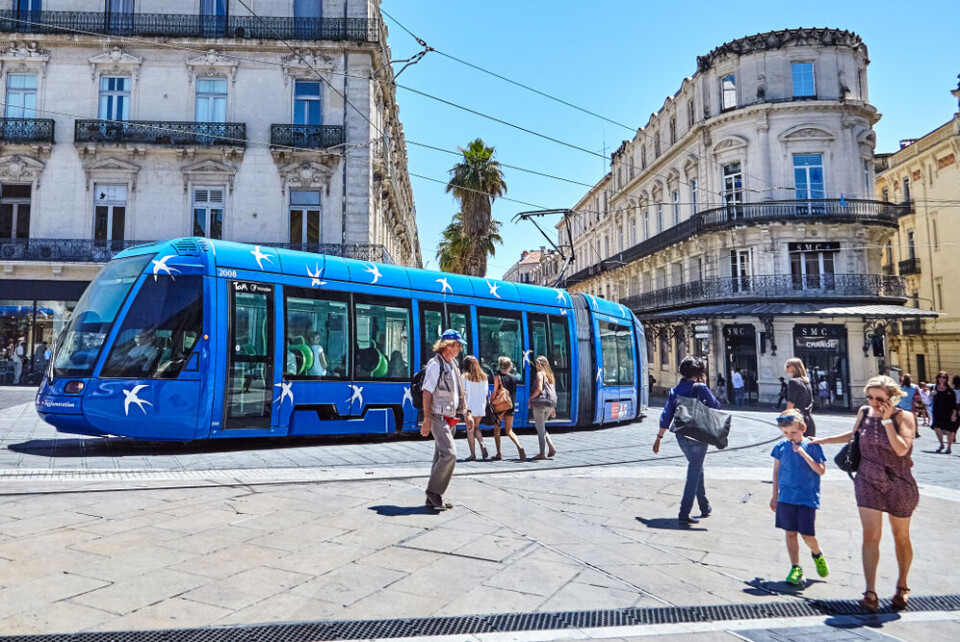-
Flights to and from France not expected to be affected by Gatwick Easter strike
Travellers are still advised to check their flight details this weekend
-
People in France snubbing US travel, report travel agents
The political context, weak euro against the dollar, and border issues have all been blamed
-
90/180 days rule: Can visa-free days be used to enter France before start of visa?
Be wary of spending too much time in France or you may be seen as a tax resident
Montpellier makes all public transport free for residents
‘I hope it will inspire other major cities,’ said the mayor

Residents in Montpellier have been given an early Christmas present after the city made all public transport permanently free.
The city’s 500,000 residents can now use a dedicated transport pass - either via a card or on a smartphone.
Authorities said it was an eco-friendly measure that would increase public transport use and reduce private vehicle use, and also help residents of the Occitanie city at a time when inflation and the cost of living are high.
The measure was brought in gradually. It began in 2020 with free transport at the weekends, and was then extended in 2021 to include free transport all week for the under-18s, and over-65s.
"I hope it inspire other major cities,” said Michaël Delafosse, mayor and president of Montpellier Metropole, ahead of the launch, to BFMTV. “[We are proud to] reconcile ecology and purchasing power and respond directly to the inflation that is undermining households,” he said.
Before the move, the average spend on public transport in the city by a couple with two children (for example), was €1,472 per year.
How the free travel pass works
To get a travel pass for free travel, residents must show proof of address to prove they live in the eligible zone.
Once they have this, they will not need to validate their journey, but must be able to show a valid pass in case of a check. The pass will be renewable every year, again with proof of address.
All of the city’s trams will now use a ‘light beam’ to count the number of people entering and leaving a tram, said Julie Frêche, Montpellier vice-president in charge of transport, to BFMTV.
Increased passengers and investment
Before the free measure, there were 86,000 public transport season ticket pass holders. There are now 260,000.
Overall, the city hopes to see a 20% increase in public transport use. The most recent figures on the subject - from a 2023 report from the Chambre régionale des comptes - shows that in 2019 (pre-Covid), there were almost 84 million journeys per year on the network.
In a bid to ensure a good quality of the network despite the free journeys and increased passengers, the city has invested in 70 new electric buses and 77 new tramway carriages, at a cost of €224 million.
However, the same 2023 report warns that the more free transport is offered, the worse the service may become.
Tourists and non-residents
Tourists and non-residents will still have to pay to use the network and prices may rise. Currently, one journey costs €1.60.
Critics of the plan say it unfairly penalises commuters, who live outside of the ‘resident’ zone but who still make regular trips in and out of the city.
“These people have already had to give up living in the city because of the financial pressure,” said Alenka Doulain, from the party MUPES (Montpellier, union populaire écologique et sociale), “And now they will not see any transport improvement either.”
To fill the financial hole left from fewer ticket sales, the city will increase a gradual tax on businesses that employ more than 11 people. However, it says that it will save €2 million per year because there will be far fewer validation machines, and therefore much lower maintenance costs.
Free transport trends
Marseille is the largest city in France to introduce free transport for residents. Other towns with free transport for residents include Dunkirk, Aubagne, and Compiègne.
Outside of France, notable places to have done this include Tallinn (Estonia, 445,000 residents) which has had free public transport since 2013; and Luxembourg, where all 650,000 residents have been able to travel for free since 2020.
Related articles
Monaco trials free bus services - here's what you need to know
What travel discounts are available for over-60s in France?
























